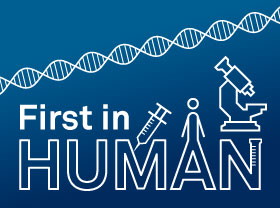S&P Global Offerings
Featured Topics
Featured Products
Events
S&P Global Offerings
Featured Topics
Featured Products
Events
S&P Global Offerings
Featured Topics
Featured Products
Events
Banking & Capital Markets
Economy & Finance
Energy Transition & Sustainability
Technology & Innovation
Podcasts & Newsletters
Banking & Capital Markets
Economy & Finance
Energy Transition & Sustainability
Technology & Innovation
Podcasts & Newsletters
S&P Global Offerings
Featured Topics
Featured Products
Events
10 Mar, 2021
By Michael Gibney
 |
This is a recurring column on clinical research in the early stages of development, which is referred to as phase 1. These are treatments being used for the first time in a small number of human patients to determine safety, dosing and general pharmacological activity.
Messenger RNA vaccines have already scored early successes during the COVID-19 pandemic and Gilead Sciences Inc.
has bet that this technology could be used to achieve another pharma first: a long sought-after HIV inoculation.
With mRNA vaccines from Pfizer Inc.-BioNTech SE and Moderna Inc. receiving emergency use authorization to fight COVID-19, Gilead Senior Vice President and Virology Therapeutic Area Head Diana Brainard said in an interview that the stage is set to use the technology in other areas that have long stymied researchers, including HIV inoculation.
Gilead is collaborating with fellow California biotech Gritstone Oncology Inc. — for $60 million up front in cash and equity investment as well as up to $725 million if all milestones are met — to access the smaller company's platform that uses both mRNA and an adenoviral vector in what is called a "prime-boost" vaccine.
Gilead plans to begin a phase 1 study of the vaccine — for which it will provide the antigen — and holds an exclusive option to develop and market the shot into later stages.
"The prime-boost approach is very common in vaccines where you first expose the body to where you want the immune response, and then you use a different type of shot to give the body another view on the target," Brainard told S&P Global Market Intelligence. "You look at it from one side, you look at it from another, and that really gives the strongest immune response."
The durability of response shown as a proof of concept for COVID-19 mRNA vaccines can offer an advantage against the difficult HIV target, Brainard said.
|
Gilead Sciences Senior Vice President and Virology Therapeutic Area Head Diana Brainard |
"I think the vaccines from Pfizer and Moderna really prove very nicely for the first time that mRNA vaccines can really be effective on a large scale and, importantly, safe."
Gilead and Gritstone had been in talks well before COVID-19 vaccines became a reality. Despite the emergence of mRNA as a tool to fight the pandemic, the technology has been around much longer than that.
"If you've laid the foundation, and then you're ready to move quickly and take advantage of those data, that's what I think really leads to success," Brainard said.
In entering the HIV vaccine fray, Gilead joins companies like pharmaceutical giant Johnson & Johnson, which has a candidate in mid-stage African trials.
The HIV challenge
Gilead, which specializes in HIV therapeutics and daily preventative medications, has yet to develop a vaccine. But an HIV inoculation, because of the way the virus affects the body, has long been in preclinical circles.
"One of the biggest challenges that we face in HIV care is that no one's done it yet — individual patients have been cured through bone marrow transplant, which isn't really a scalable approach," Brainard said. "We don't really have a roadmap for what 'good' looks like there, even though there are a lot of hypotheses and a lot of educated guesses to achieve a cure."
One of the difficulties in HIV vaccine development is the transition from studies in animals to humans because the viruses are not the same.
"What we're relying on is looking at the animal models, and then making assumptions with a slightly different disease that what we see in animals will translate to success in humans," Brainard said.
In phase 1 studies, Gilead will focus on a dose escalation process to discover which methods elicit the most robust immune response, she said.
The end of the HIV epidemic is difficult to predict, but there are reasons to be optimistic that science is finally approaching an answer, Brainard said.
"I don't have a crystal ball, but what I can say is that we are closer than we've ever been," she said. "There's continued commitment and a confidence that with the right science and the right attention, we can figure this out."
The COVID-19 pandemic has shone a light on virology and immunology in a way that can accelerate major advances for other conditions, Brainard said.
"There's more of a recognition of the value of focusing on virology, and you can see this if you look at the startup landscape — we hear about pretty much all the small startups in the immunology world, and people want to partner with us," Brainard said. "And the number of companies that are forming and coming together just over this past year has increased dramatically."
